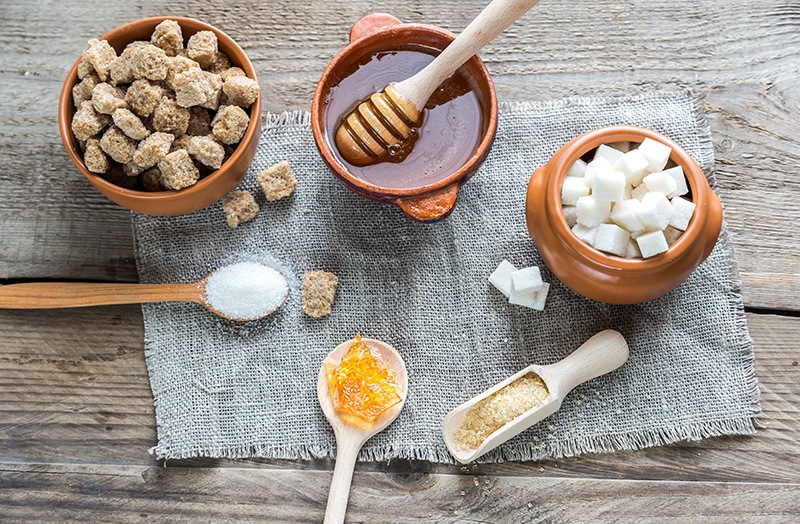Cereal, bagels, jelly, yogurt, and spaghetti sauce. What do they have in common? They are all sources of hidden SUGAR. The debate of sugar seems settled across the board; Sugar. Is. Bad. Or is it? You’ve likely heard the following phrase “everything in moderation”, so let me encourage you that sugar is something you CAN HAVE… in moderation! While it’s great to challenge the disciplines of perseverance and commitment, swearing off sugar for the long haul is a little unrealistic, and wellness is all about lifelong changes you can make. Assigning yourself an impossible task brings nothing but defeat, causing further setback than when you first set out on the challenge! In light of this, let me give you some extra perspective.
The revised Dietary Guidelines for Americans (DGAs) have adjusted intake recommendations on added sugar to allow it to account for 5% of of your total calories. To be more specific, you’re allotted 15% of your calorie intake to be split between saturated fat, sugar and alcohol. To evenly split those three food entities, 5% can account for added sugar. This means that a person able to meet their energy need with 2000 cals a day can permit 25 grams of added sugar to satisfy the DGAs. That includes alcohol; if you don’t imbibe, you can allow 7.5% of your calories to be from added sugars (38 grams/day). However, there’s a critical caveat that needs your attention: these amounts are only assigned to someone that gets 2000cals/day, and many people are not allotted quite so many calories each day!
Now, why bring this up? Well, if you’re undergoing a major diet overhaul and are trying to eliminate sugar as a part of your strategy, your battle is intensified, possibly to the point of defeat when trying to remove sugar completely. Wellness isn’t just about what to avoid, but more so, what foods do you need to add? It may take a little sweetness for your tongue to tolerate adding healthier items. If a sprinkle of cane sugar or honey makes the oatmeal less pasty, use it! You may now respond with “Terri, if I want to add oatmeal to my mornings, I’ll buy the instant kind.” Let me respond with my normal “have you looked at the nutrition label?” I’d like you to note that instant oatmeal has ~9gr of added sugar for such a small packet. Making an at home version will take your morning so much further than that puny package. Consider the following recipe and notice that it includes a sprinkle of sugar (1tsp) which is half of the amount in the instant version.
Try making it like this: 1/2C oats, a small splash of vanilla, chopped apples, cinnamon, milk and sprinkle it with ONE tsp of sugar. One tsp is four grams of sugar, not nine so you’ve stepped toward wellness with adding the wonderful goodness of oatmeal to your diet, but sidestepped excessive sweetness. Congrats!
My point: A little sugar is JUST FINE if it gets the good stuff intof your body! That’s why the DGAs permit some, and do not suggest total elimination.
To go a little further, the topic of sugar elicits a lot of questions.
But let’s say you don’t understand grams.
The math is simple, but the visualization is more important. That’s why I want you to think about the gram to teaspoons conversion.. Consider that every teaspoon of sugar is four grams. When you look at the nutrition panel and see that a soda has 44grams of sugar, you think “who cares?” It’s because 44 grams holds no relevance to you.The reason you keep hearing that “soda is bad” is because the amount of sugar in a 12oz can of coke is not only 44grams, but that is equivalent to ELEVEN teaspoons of added sugar! (And doesn’t contain a single nutrient!) You can take this math and apply it to anything with a food label.
_____grams of added sugar from the nutrition facts panel / 4 = number of tsp added sugar in a serving
And what about the sweetness of sugars naturally in fruits? Don’t fret! We’re talking about added sugar when keeping track of sugar consumption. While sugar in fruits count when keeping track of carbs (for diabetes, etc), they do not in terms of honoring the DGAs.
Let me address “hidden” sugars:
How can you find where added sugars are hiding? The answer to this one is in the ingredient list. Sugar has A LOT of different names. It’s astounding to discover that some foods have 7-10 different sources of sugar! The ingredient list won’t provide quantities, but it is organized by weight. Ingredients at the top of the list are more prominent in each serving than ingredients at the bottom of ths list, so if a single sugar is prominent, it will be listed at the beginning. But as you check the list, look for multiple sources, too. Next time you’re at the store (or face to face with your pantry) check out the ingredient list of your favorite cereals, packaged/convenience foods like instant oatmeal or granola bars, and canned vegetable-based items (remember spaghetti or pizza sauce?) Another good way to scan through the list is by looking for words that end in -ose. Dextrose, sucrose, fructose, maltose, etc, as well as the words syrup, juice, honey, nectar, and sugar will also help you determine how many types of sugar are in a food.
Lastly, what about healthy sugars like honey and agave?
The short and simple of this one is that once food goes into your body, your tummy will not distinguish between which foods were sweetened with less- or more-refined sugars. Your body will release hormones and enzymes to start digestion, and ALL of it will become glucose. So all sugars need to be accounted for equally when trying to track or minimize your sugar intake. Honey is no better than cane sugar. Agave is no better for you than dextrose. End of story.
Is this all a wash to you? Need help getting your butt in gear? Or, do you just have more questions? By coming to see me, we’ll get started by determining how many calories YOU are allotted in a day. Most people do not sit at 2000 and without doing a little math, we can’t make any adjustments to your food that pertain TO YOU! Email me and we’ll pinpoint an individual food strategy that gets you reaching YOUR goals, pronto.
Eat Well to Live Well!
Terri
Dietitian
Clubworx


